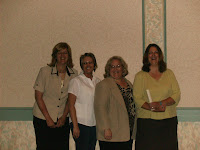Lifted from Yahoo News:
Students in public schools have math scores that are just as good if not better than those of students in private schools, according to a new national study.
The research focused across several years on 9,791 kindergarten through fifth-grade
students.
"These data provide strong, longitudinal evidence that public schools are at least as effective as private schools in boosting student achievement," said researcher Christopher Lubienski of the University of Illinois.
Combined with other, yet-unpublished studies of the same data, which produced similar findings, "we think this effectively ends the debate about whether private schools are more effective than publics," said Lubienski, whose research has dealt with all aspects of alternative education.
This is important, he said, because many current reforms, such as
No Child Left Behind, charter schools and vouchers for private schools, are based on the assumption that private schools offer better education than public schools.
The new study, detailed in May issue of the education journal Phi Delta Kappan, also involved doctoral student Corinna Crane and education professor Sarah Theule Lubienski, both of the University of Illinois.
Unlike literacy, math is viewed as being less dependent on a student's home environment and more an indication of a school's effectiveness, Sarah Lubienski said.
A
previous study by the Lubienskis heated up controversy over the quality of private school education. It showed that students' math scores are better at public schools than at private schools, when controlling for socioeconomic status, but some critics said that study failed to show the possible effect over time of different types of schooling.
The data for the new study addresses the criticism with data from the Early Childhood Longitudinal Study, Kindergarten Class of 1998-99 (or ECLS-K), administered by the National Center for Education Statistics (NCES), part of the U.S. Department of Education.
The ECLS-K database includes student achievement and background information drawn from a nationally representative sample of more than 21,000 students, starting with their entry into kindergarten in the fall of 1998.
The most recent data available for the University of Illinois study was gathered in 2004, in the spring of the students' fifth-grade year. The sample used for the study included students in 1,531 schools (1,273 public, 140 Catholic and 118 other private schools).
After controlling for demographic differences among students and
schools, the researchers found that public school students began kindergarten with math scores roughly equal to those of their Catholic school peers. By fifth grade, however, they had made significantly greater gains, equal to almost an extra half year of schooling, Sarah Lubienski said.
Part of the explanation, she said, might lie in the fact that Catholic schools have fewer certified teachers and employ fewer reform-oriented mathematics teaching practices.
Public school students also "rivaled the performance of students in other (non-Catholic) private schools," the researchers wrote. After adjusting for demographics and initial kindergarten scores, they found that achievement gains between
kindergarten and fifth grade were roughly equal.
"School type alone doesn't explain very much of why these scores vary ... in truth, whether the school is public or private doesn't seem to make that much difference," Sarah Lubienski said.
The researchers go on to write that they "personally see private schools as an integral part of the American system of education" and "there are many valid reasons why parents choose private schools and why policymakers may push for school choice."
Academic achievement, however, may no longer be one of those reasons, they write. "Claims that simply switching students from one type of school to another will result in higher scores appear to be unfounded," they write.








